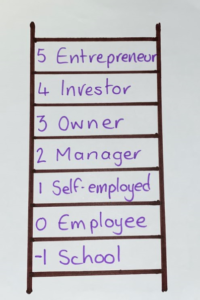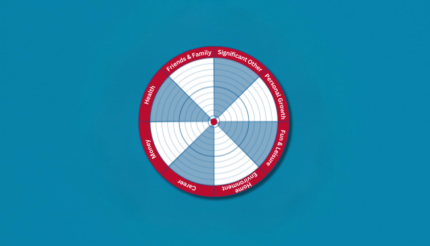A successful organisation is a commercial, profitable enterprise that works without you. As an employee, you make money to pay the bills and buy the things you need. But, when you go into business, you need to focus on generating wealth. And the ultimate goal is to build something that makes money even when you’re not there. To reach this goal, you have to move up the ladder of wealth.
The Seven Levels of the Ladder of Wealth
Level -1: School years
The entrepreneurial journey starts at school. It may seem hard to believe but learning to be in business for yourself begins whilst you’re a student. School doesn’t teach you how to be a business owner – but it’s here where you learn and develop the skills that you will use as an employee.
Level 0: Employee
Ideally, you’ll work in different roles at different companies to learn how to be a business owner. If you change jobs often and you’re told that your CV doesn’t look right, it’s a sign that you’ve developed considerable skills because moving from company to company comes with opportunities to learn. People who work in multiple organisations are more likely to become business owners than those who have held a single position for 20 years.
Level 1: Self-Employed
Going from employee to self-employed is one of the most challenging steps on the journey to entrepreneurship and that’s because it requires a massive change in the way you think and act. You can’t wait for someone to tell you what to do anymore as you’re the owner. You need to plan and do the work yourself, which means you need to know a little bit of everything – marketing, sales, purchasing – to run your business.
Around 80% of businesses fail at this level because it’s too much to handle. People go back to getting jobs and working for someone else, simply because it’s easier.
Level 2: Manager
You might think that it gets more manageable at this point, but it doesn’t. In the beginning, you’ll have more people making mistakes than when you were handling it all on your own.
The trick here is to understand that when you run your own business, you can’t do everything alone. If you feel no one does the job as well as you, it’s because you haven’t trained your employees well enough or hired the right people.
Bring into your organisation people who are better than you are, or coach your employees and help them improve. The manager isn’t someone who thinks “How do I get the job done?”, Managers build teams to get the job done and make a profit.
Level 3: Owner
To get from manager to owner, you need to go through another mindset change and that’s the moment when your business works whether you are there or not.
You need to remember that it’s not busy-ness; a successful company doesn’t mean an 80hour work week. You need to become a leader and build a company that continues to make money even when you take a six-month holiday and only check in with your team once or twice a month. Here at ActionCOACH, this is what we call a finished business.
Level 4: Investor
People who reach this level of business stop planning their movements around cash flow. They don’t run a business just to have a job and income as they have learned that investing is all about capital and looking for opportunities for making money outside of their company.
The secret is not to spend your profits just because you want to buy things, as that’s the path to bankruptcy.
Investors learn three things:
- businesses (how to buy, build and sell companies)
- real estate, and
If you’re ready to become an investor, you need to learn how to develop profitable organisations.
Level 5: Entrepreneur
Entrepreneurs are people who raise capital and invest more than just their money. They build excellent businesses by bringing together other people’s ideas, time and resources.
So, how do you reach this level?
Commit to learning
 The most challenging part of being in business is learning.
The most challenging part of being in business is learning.
Climbing the ladder of wealth is mostly about personal development, acquiring new skills and growing with your organisation. It’s about setting goals and identifying the action you need to take and the strategies to learn to achieve them; you can’t grow your business if you don’t grow yourself.
It’s not enough to have a vague idea about where you are; you must know where you are so that you can see where you want to be. And when you know what you want to achieve, you can identify the areas of knowledge in the business where you have a gap.
Sit down and start planning how to fill these gaps so that you can get from self-employer to manager or move from manager to owner.
Brad Sugars, ActionCOACH founder and CEO, says, “you can’t earn more than you learn”, so every person who wants to become an entrepreneur should follow the advice of Jim Rohn, one of the best business philosophers:
- Never wish life was easy; wish that you were better.
- Work harder on yourself than you do on your job.
- Read a book a week for the rest of your life.
What’s Next?
Write down your goals. Imagine your finished business and set a date three, seven, or ten years from now. You need to visualise your success to identify the steps you need to take to get there.
When you know what you have to do, you can work on your business, not in your business.
After closing sales, find time to grow your company.
Along the way, you’ll need to remember this:
- We all make mistakes. As long as it doesn’t kill your business, you’ll be fine! Understand what went wrong and how you can do things differently the next time. Mistakes are lessons and will come full circle to help you build a business.
- Do your homework. You need to take actions that will make a massive difference to your business. You’re not an employee anymore. No one will tell you what needs to be done.
- Ask for help. The path to entrepreneurship is a huge learning curve – it’s impossible to know everything yourself. You can find a coach, get in touch with other business owners willing to help, or both.
It’s time to learn how to be a business owner and build your way to entrepreneurship.
If you would like to find out more, sign up for a free coaching session where I’ll explain how to build your way to entrepreneurship.






Comments